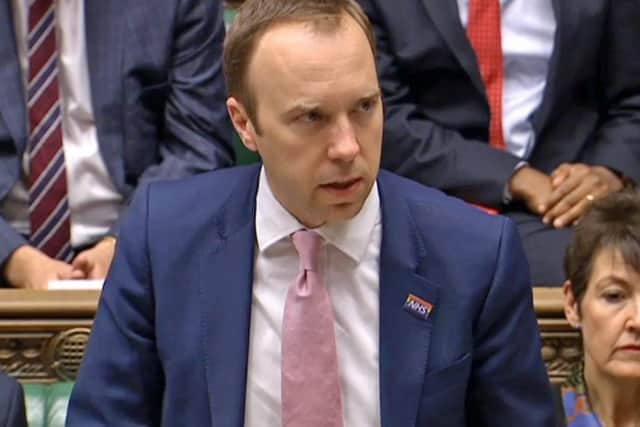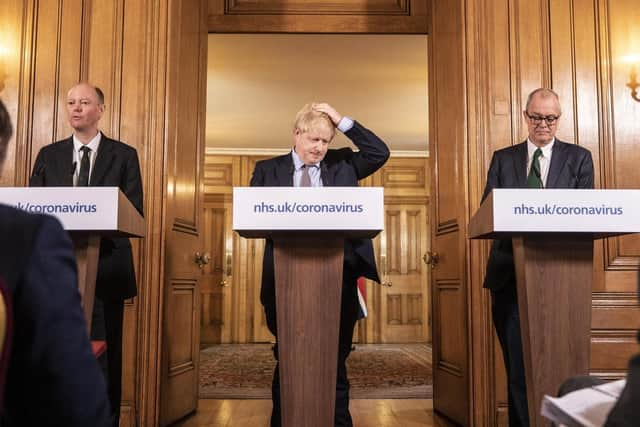Matt Hancock: 'We are in a war with an invisible killer - we will fight coronavirus with everything we've got'
Delivering a sombre, but defiant, statement to the House of Commons Mr Hancock likened the fight against the virus to a battle and admitted measures the Government was forced to introduce were “draconian”.
He said: “Our policy is to fight this virus with everything we’ve got”
Advertisement
Hide AdAdvertisement
Hide AdMr Hancock said the Government was “expanding testing as fast as we possibly can” and announced that all non-urgent procedures would be cancelled to take the strain off the NHS.


He said: “We’ll get through this by working through our action plan to contain, delay, research and mitigate the virus and that plan has two overriding aims - to protect the NHS by building it up and flattening the curve and to protect life by safeguarding those who are most vulnerable.”
Mr Hancock added: “Our goal is to protect life.”
He said normal life would not be able to continue for the foreseeable future, and added: “These actions will change the ordinary lives of everyone in this country. We appreciate that they are very significant, and I understand that people will be concerned.
“But we have come to the view that they are necessary to save lives and to stop this disease.”


Advertisement
Hide AdAdvertisement
Hide AdIt comes after the Prime Minister Boris Johnson held a press conference in Downing Street, the first of what will now be a daily occurrence.
Flanked by the Chief Medical Officer Professor Chris Whitty and the Chief Scientific Adviser Sir Patrick Vallance, the PM set out the need for “drastic action” to tackle the “fast growth” of coronavirus across the UK as increased social distancing measures are introduced for the population.
As part of the measures, anyone living in a household with somebody who has either a persistent cough or fever must now also isolate themselves for 14 days.
All people should avoid gatherings and crowded places, while people who are vulnerable - including those who are elderly - will need to undertake even more drastic measures.
Advertisement
Hide AdAdvertisement
Hide AdThe measures were announced as the death toll of people with coronavirus in the UK reached 55.
The Prime Minister said that according to the Scientific Advisory Group for Emergencies (Sage) “it looks as though we are now approaching the fast growth part of the upward curve” in the number of cases. He said: “Without drastic action cases could double every five or six days.”
Mr Johnson admitted the measures were “draconian”, as the announcement marked a vast escalation in the UK Government’s response, which in recent days has been criticised for not being strong enough.
But Prof Whitty said the country should be ready for “the long game” with measures being in place for “a minimum of weeks to months”.
Advertisement
Hide AdAdvertisement
Hide AdMr Johnson warned said “unnecessary” visits to friends and relatives in care homes should cease. And he said: “You can take it from what we have just said about avoiding all unnecessary contact for those particular groups - the really strong advice that we are giving to people to avoid unnecessary contact with the over-70s, those with particular health conditions - absolutely, we don’t want to see people unnecessarily visiting care homes.”
Mr Johnson said the Government already had “tremendous” powers to enforce its measures - although he indicated that he did not expect to use them.
“Under an act of 1984, I think it is open to the Secretary of State for Health to ban handshaking if he wants to,” he said. “But I think most people would accept that we are a mature and grown-up and liberal democracy where people understand very clearly the advice that is given to them.
“I think they also understand that what we are saying obviously helps the NHS and helps us all as individuals, but it helps the whole community as well.”
Advertisement
Hide AdAdvertisement
Hide AdThe government has taken unprecedented steps to drastically ramp up the country’s response to coronavirus as the death toll reached 55 yesterday.
Everyone should avoid pubs, clubs and theatres, stop all non-essential contact and travel, and work from home if they can, the Prime Minister said.
Sir Patrick said these latest measures to combat the spread of Covid-19 would have a “big effect”.
“This is not a series of small interventions. You would anticipate that this could have a dramatic effect to reduce the peak and to reduce death rates,” he said.
Advertisement
Hide AdAdvertisement
Hide Ad“This is a matter for us to take accountability to make sure we help each other, protect ourselves and protect the NHS.”
Sir Patrick said the UK is now looking “more like three weeks” behind Italy, the epicentre of the European outbreak of Covid-19.
He said other measures may be necessary - including school closures - at some point.
Professor Whitty said measures to tackle the spread of the disease would need to be in place for a “prolonged period” and that the Government was trying to prevent “indirect deaths” - where people die because they cannot get the right medical care.
Advertisement
Hide AdAdvertisement
Hide AdHe added: “This is going to go on for some time. We should not be under any illusions that ‘if we just do this for a couple of weeks that is sufficient’.”
Prof Whitty said the group of people who should take this advice particularly seriously “are older people above 70, people who in adult life would normally be advised to have the flu vaccination, so these are people with chronic diseases such as chronic heart disease or chronic kidney disease, and also - as a precautionary measure because we are early in our understanding and we want to be sure - women who are pregnant.
“Those are the groups we want to take particular care to minimise their social contact which of course will have very significant risks for them,” he added.
The G7 - the group of seven countries with the most advanced economies - recognised the virus outbreak was “a human tragedy and a global health crisis”, vowing to work together to help the economy recover.
Advertisement
Hide AdAdvertisement
Hide AdMeanwhile, Mr Hancock said: “We’ll give the NHS whatever it needs, and we will do whatever it takes.”
Mr Hancock added: “So we are increasing the number of ventilators. We’ve been buying ventilators for several weeks now but we also need to manufacture more and as we’ve discussed in the House, there is no limit to our appetite to buy ventilators and there should be no limit to the appetite of industry to make them because around the world everybody is trying to increase their ventilator capacity.”
He also said he wanted as many tests for coronavirus available as possible, as soon as possible.
Earlier in the day the World Health Organisation said the key to beat coronavirus was to “test, test, test” and the UK came under fire for restricting testing to only those in hospital.